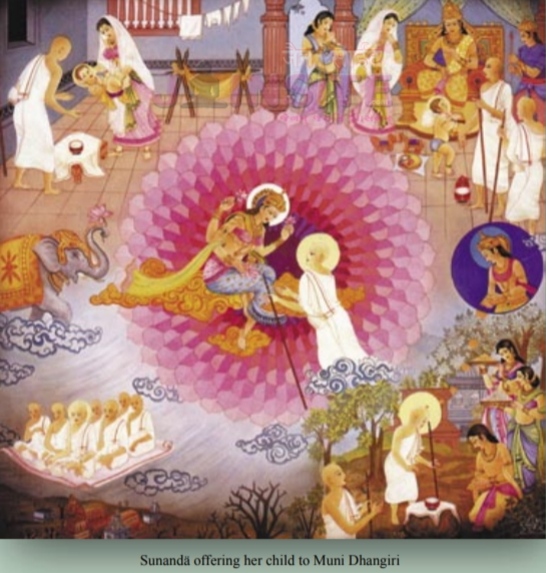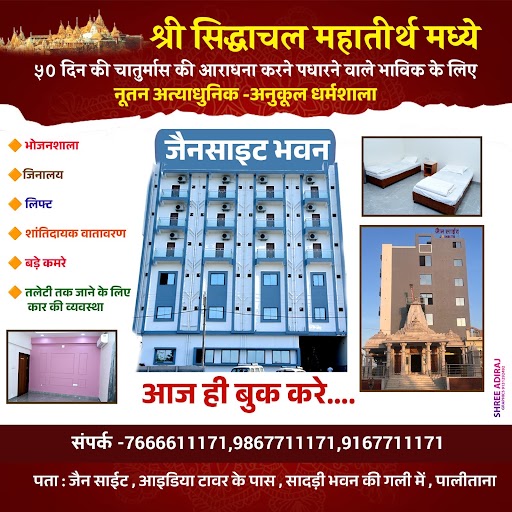Vajrakumär
In the city of Tumbivan, there lived a rich Brahmin called Dhangiri. He had a beautiful wife named Sunandä. Their life was full of joy. When Sunandä was pregnant, she had a beautiful dream. She told her husband, who was also a scholar, about the dream. He told her that she would give birth to a bright and charming child. She felt very happy.
One day a Jain Ächärya named Sinhgiri came to the city. Both Dhangiri and Sunandä went to listen to his sermons regularly. Dhangiri’s soul was awakened by these sermons, and he lost interest in his wealth, family, and worldly affairs. He decided to give up his worldly life and become a monk. He told his wife about his decision. She was shocked. She tried to convince him to stay and enjoy their life together. She also said that since they were going to have a child, it would be better to stay together to raise the child. Dhangiri did not change his mind. Nonetheless, he made the necessary financial arrangement for his family. Sunandä, who was the daughter of a religious merchant Dhanpäl, had a deep understanding of religion. Therefore, she accepted his decision. Sunandä was consoled that at least she was the wife of a virtuous man.
A few months later, Sunandä gave birth to a very handsome boy. He was lovable because he always had a smile on his face. Everybody who saw him liked him from the very first glance. Sunandä celebrated his birth. She felt happy that she had a son to raise but her happiness did not last long. One day some ladies from the neighborhood were visiting her and started talking about her husband. One of them said, “If Dhangiri had not taken Dikshä (to become a monk), then he would have celebrated the birth with more extravagance than Sunandä.” The child, although a baby, heard the word “Dikshä” and started thinking. He felt as if he had heard the word Dikshä before. While thinking about it, he suddenly remembered his past life. He realized that he was on the right spiritual path. He decided that he should take advantage of being born as a human again and should utilize this life to further uplift his soul. He should become a monk like his father. He also realized that his mother would not let him go because he was her only hope and joy. He started thinking about what could be done to get her permission.
At last, he came to the decision that since his mother would not let him go willingly; he should create a situation whereby she might get tired of him and give him up. He was still a little boy in the crib when he thought, “If I keep crying all the time then she will get tired of me and maybe she will try to get rid of me.” He put his thoughts to work right away. He started crying. His mother came running to comfort him, but he just kept crying. She tried everything but nothing helped to quiet him down. She took him to the doctors and took advice from others but nothing worked. The child’s trick worked. Even their neighbors who had liked this child very much got tired of him. Finally, his mother was fed up with him but did not know what to do with him. The child was now six months old and monk Dhangiri (the child’s father) and Ächärya Sinhgiri visited the city again. Sunandä came to know about this and thought of giving the child to his father.
At the usual time for alms (going to collect food), Dhangiri Muni asked permission from the Ächärya to go for alms. Ächärya Sinhgiri told him, “Dhangiri, today you may accept even a live thing if it is offered.” The Ächärya possessed a special power and he knew what alms monk Dhangiri was going to get so he gave his permission ahead of time. Although Muni Dhangiri did not understand what his guru meant, he left for alms. On his route to various houses, he arrived at Sunandä’s house. He said, “Dharma Läbha” (May you follow the proper religion). Sunandä recognized the voice. She welcomed Muni Dhangiri and expressed happiness in seeing him again. She invited him to enter the house for food.
The young boy also heard Muni Dhangiri’s words “Dharma Läbha”. He thought that this was the best opportunity for his trick so he started crying. This irritated his mother and she told the monk, “You arelucky to be able to uplift your soul but I am tired with the burden of your child. He does nothing but cry.He does not let me rest and I am very unhappy. Please accept him so there will be peace in the house.” The child heard these words and became very happy in his mind. He hoped that Muni would accept her proposal. Muni Dhangiri remembered the words of his Guru spoken right before he left
for alms. Now he understood what his Guru meant. He said, “Sunandä, if you really want to give this child away, I will accept him, but please think twice. Once you give him away you will not be able to get him back. You will have no right to this child after that.” On hearing this, the child started crying even louder. She said, “I do not want to hear this crying anymore. I am so sick and tired of him that I do not want him around at all. You can take him forever.”
She picked up the child and put him in the Muni’s cloth bag. As soon as the boy was handed over to the Muni, he stopped crying and started smiling. Sunandä was surprised by this and kept looking at the boy. However, she was determined to give him away. Muni left with the child to go to the Upäshray
(place where monks stay). Ächärya Sinhgiri saw that Muni Dhangiri was carrying something heavy. So he asked him, “Why is your bag so heavy?” When the Muni opened his bag, his Guru saw the handsome smiling boy. Since he was so heavy the Ächärya named him “Vajrakumär”.
Ächärya Sinhgiri requested a prominent Jain Shrävak (householder) to take care of Vajrakumär and tomake sure that he was taught Jain religious teachings as he had the potential of being a great Ächärya in the future. The Shrävak brought Vajrakumär home and told his wife what Ächärya Sinhgiri wanted them to do. She was a very religious woman and happily agreed to the wishes of the Ächärya. She loved theboy so much that she would not let him go anywhere without her. She always took him to the Upäshray
to see the Sädhvis (nuns). Even though he was little, he listened to and memorized all the scriptures the nuns were reciting. By the time, he was three years old, he had learned up to eleven Angas (oldest Jain scriptures). He was respectful to everybody and talked very intelligently.
One day, one of Sunandä’s friends came to her house and said, “Do you know that your child, who kept crying, spends a lot of his time at our Upäshray? I have never heard him cry. He is a very charming and lovable child.” Sunandä tried to ignore what her friends told her but after all she was Vajrakumär’s mother. She longed to see her son again. She started thinking, “How could I have done such a terrible thing? How could I have given up my precious child to a Muni? After all, he is my child. I should get him back.”
A few days later, Ächärya Sinhgiri and Muni Dhangiri came to Tumbivan again. She went to the Upäshray. She approached Muni Dhangiri and asked him “Please, give my son back. I cannot live without him any more.” Muni Dhangiri said, “I told you at that time that once you have given him away you will not get him back. Remember, you said you did not want him at all. We cannot give back what we take.”Sunandä said, “I do not know why I did that. I cannot live without my son. Please find a way to give me back my son.”Ächärya Sinhgiri and Muni Dhangiri tried to convince her to forget him, but she was determined to get him back.
At last, she went to the king and requested, “Please help me get my son back. My husband has become a monk and I am lonely. He is the only child I have. Please ask them to return my son.” The king heard the whole story from Sunandä. He said, “Let me find out what happened, and I will let you know shortly.” He inquired about the situation and found that because Sunandä was tired of her son’s incessant crying, she had voluntarily given away her child.The king called Sunandä and told her, “Sunandä, when Muni Dhangiri came to your house for alms you gave your child away voluntarily because you were fed up with his crying. Once you give something you cannot have it back.” Sunandä said, “Oh King, this is not a thing. This is my own flesh and blood, and he is the only hope I have.
Please do something to get him back. I cannot live without him.” The king could feel the motherly affection and sincerity in her voice. He was also puzzled. Ultimately he told Sunandä, “I will call you and Muni Dhangiri in the courthouse and let Vajrakumär decide whom he wants to go with. Is it okay with you?” Sunandä said, “Yes, Your Majesty.”

Sunandä offering her child to Muni Dhangiri


